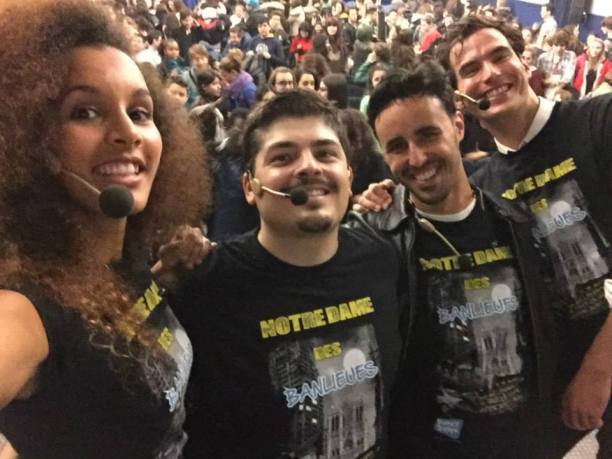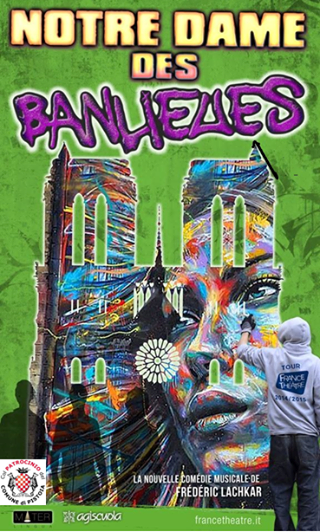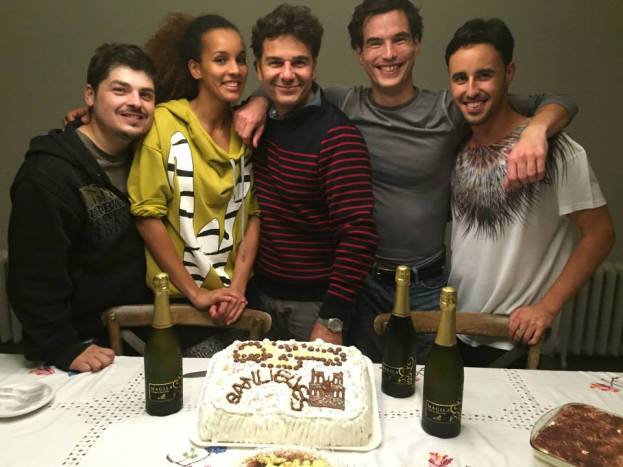
Après avoir assisté le 17 novembre dernier au spectacle “Notre Dame des Banlieues”de la Compagnie France Théâtre la classe 5a a écrit quelques réflexions sur une des chansons entendue.
La chanson “Coeur de bombe” de Diam’s raconte un amour qui finit mal comme dans le roman de Victor Hugo Notre Dame de Paris ( qui a inspiré le spectacle écrit par Frédéric Lachkar) et aussi comme les amours de nos jours qui trop souvent donnent lieu à des explosions de violence.
Texte de la chanson:
Coeur de bombe – Diam’s
Petit coeur est tombé… sur une bombe. (x2)
Petit coeur est tombé… et ça fait mal, ça fait mal.
Ҫa commence par des regards,des promesses,
des « Oui mais… », de la romance tard le soir,
des sms, des emails,des ballades près du canal,
des blablas, des silences.
On se partage nos balafres et là voilà, c’est l’évidence.
Les lèvres, la langue, le coeur et la lenteur,
le rêve, la chance, les heures d’apesanteur.
Délirer sur l’avenir des nuits passées en autarcie.
« On le fait ? »
« Pas tout d’suite, attends non chérie pas tout d’suite. »
Coupés du monde, à fond dans la relation,
toi t’es ma bombe, les autres c’étaient tous des cons
de toute façon, toi c’est pas pareil t’es une perle tu sais, t’es rare.
Je crois que ‘Je t’aime’ etc, etc…
Petit coeur est tombé… sur une bombe. (x3)
Petit coeur est tombé… et ça fait mal, ça fait mal.
Quelques mois plus tard, je déménage, on emménage.
Les nuages cachent l’orage, on le sait, on l’envisage.
La bombe est tranquille,
la femme un peu moins sûre, reflexe de fille,
je veux tout vite et bien plus.
Puis la folie reprend vite, mais la vie la bousille*. (=rovina)
Et oui, faut-il encore savoir gérer la routine.
Venus et Mars s’accusent parce que l’amour ça tue le temps,
mais quand le temps tue l’amour alors Venus s’excuse.
Feminine passionée, horloge biologique,
Masculin dépassé, problèmes psycholoqiques.
« Le mariage pourquoi attendre ? Pourquoi pas, vas-y, dis-moi.
Non mais attends tu peux comprendre chérie, ça ne fait que huit mois.
Et les enfants tu y penses ? Et si on devenait parents ?
Mais attends tu peux comprendre ma belle, ça ne fait que 3 ans.
T’es tarée, t’es trop speed, trop triste pour moi.
Ma chérie ‘Je ne t’aime plus’ etc, etc… »
Petit coeur est tombé… sur une bombe.
Petit coeur est tombé… et ça fait mal, ça fait mal. (x3)
J’te laisse imaginer la suite, la rage et les pleurs.
« Qui garde l’appart» et le partage des meubles ?’
Il m’insulte, me lynche, me tire même son chapeau.
C’est donc vrai derrière les princes, y’a toujours un crapaud.
Je laisse les anges répondrent
et me donner de la force, car pour sûr ma jolie bombe
reviendra taper à ma porte.
Je le sais, il me dira ce que je rêvais d’entendre, qu’il veut enfants
et me marier sans attendre.
Il me dira combien il lutte et souffre, se rappelant de nous deux
sous la lune recherchant la grande ourse.
A peine 3 mois après la rupture, je le verrai ramper,
camper sous la pluie au pied de mon appart trempé.
A tous les hommes qui en bavent car la femme est plutôt chiante,
mais si douce, possessive et attachante.
N’attendez pas qu’elle parte, retenez-la, épousez-la,
avant qu’une autre bombe ne lui dise « Je t’aime » etc, etc…
Petit coeur est tombé… sur une bombe.
Petit coeur est tombé… et ça fait mal, ça fait mal.
Je suis tombée sur une bombe, une bombe comme on en voit rarement.
Le coeur fait « boum» puis tombe.
Sur une bombe.
Je suis tombée sur une bombe, une bombe qui te parle d’enfants.
Le coeur fait « boum » puis tombe.
Sur une bombe à retardement.
https://www.youtube.com/watch?v=cy5AyGT5TfE

“Une relation qui n’est pas du tout normale est une relation de dépendance aussi bien affective qu’économique, dans laquelle la femme est soumise et considérée par l’homme comme un objet qu’il doit posséder. Et ça ce n’est pas une relation d’amour, c’est une relation destructrice qui ne finit pas simplement mal, mais franchement pire! “ Melanie Paro
“ Je crois que l’amour n’est pas facile… en fait beaucoup de poètes ont dédié leur vie à ce sentiment.L’amour est le sentiment le plus beau et le plus destructif! Au début, quand on tombe amoureux, tout est vraiment magnifique mais avec le temps on comprend que la réalité est un peu différente. Je ne crois pas que toutes les histories d’amour soient comme celle que raconte Diam’s mais je crois qu’on doit comprendre bien l’autre personne et se respecter pendant toute la vie. On doit être intelligent et comprendre quand une histoire est finie et aussi laisser s’en aller l’autre personne. C’est important de rester dans une relation tranquille. On peut aimer une personne et comprendre ses limites. On doit être comme nous voudrions que l’autre soit avec nous.” Jasmine Gabrieli
“Le passage “Féminine passionée, horloge biologique,Masculin dépassé, problèmes psychologiques” décrit les deux façons de vivre, d’être et de penser quand on parle des hommes et des femmes dans une relation. La femme sensible et passionée se jette à corps perdu dans l’histoire, au contraire, l’homme agit avec prudence et circonspection et il n’est pas disposé à suivre l’horloge biologique de la femme qui sent en elle-même le besoin de se marier et d’avoir des enfants à un certain instant de sa vie. L’homme est dépassé par les évènements et quand il ne réussit pas surmonter ces moments cela lui crée des problèmes psychologiques.” Valentina DePinto
“ La dernière strophe de la chanson est dramatique en général parce qu’elle parle plus directement de la violence et du fait que l’homme viendra toujours chercher sa femme, sa proie. Il y a une phrase qui me touche beaucoup :” c’est donc vrai derrière les princes il y a toujours un crapaud. Je laisse les anges répondre et me donner la force.” C’est une phrase très triste qui souligne qu’il est difficile d’avoir confiance en un homme car le même homme que nous avons un jour aimé s’est brusquement transformé en un monstre. La femme alors, n’a pas d’autre possibilité que de se laisser aider par les anges. “ Francesca Bormolini
© Isabelle Rohmer
© Melanie Paro
© Jasmine Gabrieli
© Valentina DePinto
© Francesca Bormolini









